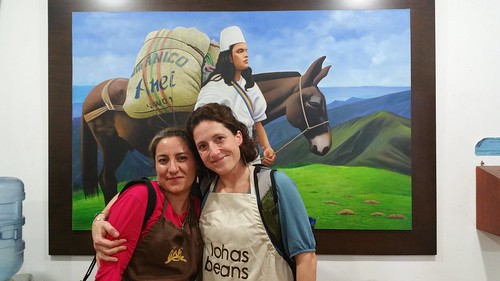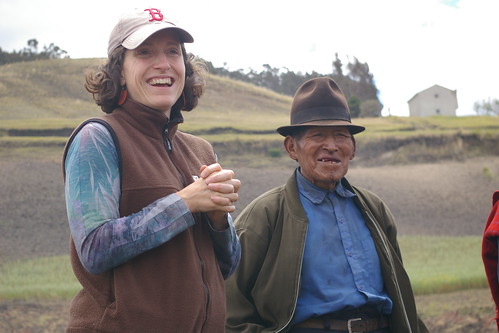
Every month, USDA shares the story of a woman in agriculture who is leading the industry and helping other women succeed along the way. This month, we hear from Catherine Gill, the Executive Vice President of Investor Relations and Communication at Root Capital. Root Capital is an agricultural impact investor that grows rural prosperity in poor, environmentally vulnerable places in Africa and Latin America by lending capital, delivering financial training, and strengthening market connections for small and growing agricultural businesses.
- Tell us about your background. What inspired you to get involved in the agricultural industry?
As a young woman, I spent some time living and working in the very Northern part of Honduras. I was partnered with a cooperative of sugar cane farmers, supporting the management team’s efforts to better connect their farmer members to market. Most of our time was spent bumping around in a four-wheel drive vehicle and meeting with farmers and their families to do financial training, getting at concepts as basic as price and cost. It was during this time that I became a devotee of Root Capital’s mission then even though I wouldn’t meet the organization for another decade.
- How did you get involved in finance? What do you enjoy about your work in fundraising?
There are two parts to the question about finance—both ideological. Finance is the language of money and money is power. When women do not have access to money and finance, they are removed from the power equation. This is a particularly acute dynamic for women working in agriculture, where access to information and basic participation can be severely lacking. I stepped into the professional world, right as the world was really digesting the role that microfinance was playing in helping us believe that there were new ways, bold ways to bring the power of the purse to women. Upon graduation from Wellesley College, I desperately wanted to be part of that new world.
The second part of the answer is about storytelling. Another way that women are often left out of the money conversation is because they don’t feel empowered to use the language of finance. As a non-finance person who studied ancient Greek in school and had never seen a balance sheet until graduate school, I saw that I could play a role in empowering women leaders (including myself) to come and to stay at the table, whether that be in the board room or in the kitchen. Before coming to Root Capital, I spent many years doing financial training for leadership teams of mission driven organizations and I found that work incredibly satisfying.
My love of fundraising is also about storytelling. I think there is nothing more exciting in the world than connection with another person. Connection is our currency as humans. And, connection happens through sharing and receiving stories. When I realized that fundraising was about connection and that if the connection is authentic and passionate about the product, then I was able to step away from the fears and negative connotations that many people bring to fundraising. Some of the most satisfying moments of my career have been in a fundraising context, where the connection with a donor or an investor is based on a deep shared passion for Root Capital’s mission. Striving for that nexus really motivates me.
- Tell us about the Root Capital’s Women in Agriculture Initiative? What was your idea for starting the initiative and what are your goals going forward?
It’s pretty straightforward – at least half of the world’s farmers are women. We are relying on these women to feed the planet and, increasingly, to preserve it. However, they are massively under resourced. Addressing this injustice has always been implicit in Root Capital’s mission and vision, but all I did was help to create a team of folks here to shine a brighter light onto our efforts. Once you have the light shining down, you get to ask yourself the most exciting question in the world: what more could we do?
We’ve been on a journey answering that question now for six years and we have, I think, come up with a number of great answers. We can aim to increase our work in domestic supply chains where women historically play a bigger role, create communities of practice to connect women who defy the odds in male dominated crops, unlock the power of the “hidden influencer” – the women who isn’t necessarily the business leader but wields outsized influence through her frequent contact with other women, and partner with our clients to use venture philanthropy to address very specific barriers in their organizations that prevent women from full participation.
- Who are your role models?
Madeline Albright and Clara Miller. For six years, I worked at Nonprofit Finance Fund, the organization that Clara Miller founded, and loved every minute. Clara has been able to create a unique and powerful voice in the world of social finance pushing us collectively to do more and do better to support the organizations we rely on as our community fabric, and I admire it intensely. She’s one of those people who says what needs to be said and does it with humor, which I also love. Madeline Albright was the commencement speaker at my graduation from Wellesley and it was one of the greatest gifts of my life. She represents the combination of ‘get #$%^’ done with deep humanity that is my ideal.
- What advice do you have for fellow women in ag, both here at USDA and all across the world?
Listen first and meet people where they are. Don’t get stuck in an ideal of what empowerment or change can or should look like. Listen to your client first and often. And, of course, be relentless!




